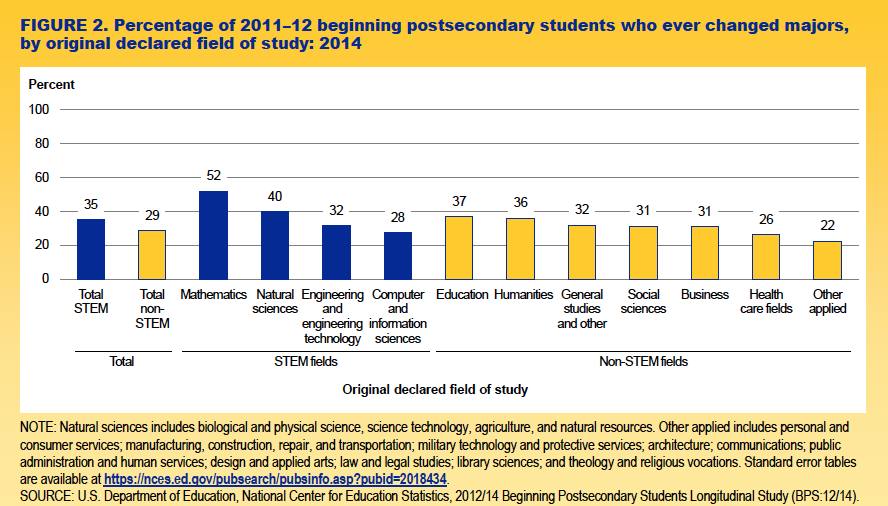
We Are Asking the Wrong Questions!
Nov 30, 2022“The problem is our kids— like some of us— end up making career choices to impress other people for a fleeting, and false, feeling of validation. In the process, we lose sight of what makes us truly happy and successful.”
One of the most frustrating questions for high school juniors and seniors is, “what do you want to do when you grow up?” Determining a career path is a difficult process that is often left up to unreliable means such as chance, relying on what one is good at as a teenager, or a direction suggested or imposed on them by someone else. But how many adults have used this method and are still saying at age 35 or 40, “I’m still trying to figure out what I want to do!”
Is relying on one of four core subjects in school really the best method to determine a career path that will influence the next 40+ years of their life?
Changes In The Workforce
The workforce has changed substantially, but our education system has not. When you look at recent data, the odds are stacked against our kids being happy.
Consider the following:
The National Center for Education Statistics (NCES) shows that only 41% of students graduate college with a 4-year degree in four years! More than half of all undergraduate students fail to graduate within four years!1
The NCES also shows that only 64% of all college students obtain a 4-year degree within six years! One third of all students fail to graduate within 6 years!2
The number one factor in delayed graduation? Changing majors!3
35% of STEM majors change their major
40% of Natural Science majors (think biology, chemistry, your usual pre-med suspects) change their major
32% of all Engineering majors change their major

Some may think that their child will figure it out, but the stakes are pretty high when we consider the Gallup State of the Workplace 2022 survey showing that “60% percent of people reported being emotionally detached at work and 19% as being miserable.” And Jane Thier of Fortune wrote a compelling article last week titled “American workers hate their jobs so much that nearly half of them wouldn’t wish it on their worst enemy”.
That’s a lot of misery to consider.
I am certain that no one wants to send their child into the world with the goal of being miserable. Perhaps these stats show it is not just the few, it is the majority that are not gaining satisfaction from their work. When you consider that most people spend ⅓ of their day at work, it does not make sense to leave this to chance.
Finding the Source
Why are so many people miserable in their jobs?
Many theories abound, beginning with variables that one has little control over: bad boss, poor work culture, etc. But more and more studies indicate that one of the greatest indicators of workplace satisfaction is feeling as though you have a purpose and you are contributing to something you believe in and have a passion for what you are doing.
When was the last time we asked high school kids what they are passionate about?

Perhaps even more importantly is recognizing that studying math, science, English, and history, while playing sports and taking advantage of in school volunteer activities, kids have not been exposed to enough to know what fuels their passion. Their education rarely changes from year to year, leaving them to decide which of the four core subjects they like the most (or in many cases, dislike the least) and then determining what majors will offer several classes in that subject.
Students are also often influenced by what they hear, whether it is valid or not. For instance, often parents tell tech savvy kids to become computer programmers because “there will always be jobs in that field.” But according to the Bureau of Labor Statistics, the job outlook shows a 10% DECLINE in the number of jobs available for the next 10 years. Do you really want your child to enter a field that is losing jobs? No!
Often, well-meaning parents provide direction without considering passion and purpose. Kids who excel in math are often told to pursue engineering, but rarely can a high school kid name even five disciplines of engineering. If it was truly something they were interested in, they would want to know more about it, what they could do with it, how they could use it to make an impact.
If you think it is unrealistic for a kid to have looked into the field they may choose as a major, ask an athlete for the stats on their favorite team, or ask a kid who loves TikTok about their favorite influencer and what brands they promote. I am quite sure you will find kids who can recite this information while having only limited information regarding their major classes and career path. This is what they are passionate about, even if to you it might seem useless or inconsequential. These interests could indicate a propensity for sports reporting, or data analytics, or marketing, or social media management, none of which necessarily fall into one simple category of the core four subjects.
We’ve Become the Problem
J.T. O’Donnell, Founder and CEO of Workitdaily.com, recently reported that after 15 years of studying why people hate their jobs she determined a core factor: praise addiction.
“We've been trained to seek out incentives like good grades, stickers, trophies, and yes, praise. We like to be liked. More importantly, we like to be respected. We want people to be impressed with us. It gives us a temporary feeling of happiness. The problem is we end up making career choices to impress other people so we can feel that fleeting rush of validation. In the process, we lose sight of what makes us truly happy.”
So how do we change the dialogue with our kids to inspire them to find the source of their passion, what will give them purpose in life, and allow them to feel they are truly following their life’s mission on earth? How do some kids grow up knowing what they want to be, and others stumble from job to job looking for happiness?
Next time we will look at some of the tools that parents can use to spark more insightful thoughts and give their child an advantage when considering their future.
REFERENCES
- National Center for Education Statistics (NCES). (2019). Indicator 23: Postsecondary Graduation. Status Trends in the Education of Racial and Ethnic Groups. U.S. Department of Education, Institute of Education Sciences. https://nces.ed.gov/programs/raceindicators/indicator_red.asp
- National Center for Education Statistics (NCES). (2022). Undergraduate Retention and Graduation Rates. Condition of Education. U.S. Department of Education, Institute of Education Sciences. https://nces.ed.gov/programs/coe/indicator/ctr.
- National Center for Education Statistics (NCES). (2017). Percentage of 2011–12 First Time Postsecondary Students Who Had Ever Declared a Major in an Associate's or Bachelor's Degree Program Within 3 Years of Enrollment, by Type of Degree Program and Control of First Institution: 2014. Institute of Education Sciences, U.S. Department of Education. Washington, DC. https://nces.ed.gov/Datalab/TablesLibrary/TableDetails/11764.

